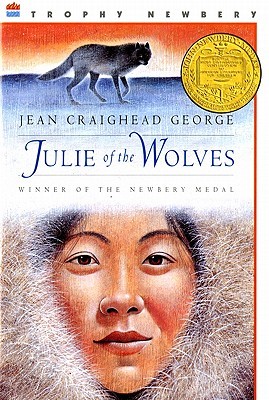I've been trying (off and on) to read through all the Newbery Award winning books. It's been fun, and I've actually been pleasantly surprised by the high quality and sentiment that I've found in many of the recent winners. But I'm going to say right up front that many of the Newbery Award winners of the 70s and 80s just don't impress me. Julie of the Wolves was the medal winner in 1973. And while I assent that the book is a fascinating story, and very well written, it's just not inspiring. But please hear me out because I do think this is a good book and worthy of a read. I just wouldn't put it on an Absolutely Must Read list.
Now, of course, there are plenty of award-winning stories that I don't find inspiring, but as I've read more and more, I've noticed general trends over the years. (And since the Newbery Awards are given each year to books that came out the previous year, it's easy to see general shifts as styles coming in and out of vogue.) The vogue for many of the 60s, 70s, and 80s books seems to be a writing style focused on realism--the sort of realism that tries to relate to people instead of inspire them. I have nothing against being realistic per se, but a story can be both realistic and inspiring, and I think those are the ones worthy of a "most significant contribution to children's literature" award.
Julie of the Wolves is written in this "realistic" style. Though, it hardly deals in normal everyday life, and it's impossible to say how truly realistic it truly is, since it's a story about a young Eskimo girl who gets lost in the wild and survives by insinuating herself into a small wolf pack. The survival story is fascinating, and the reader gets to see much of Miyax's ingenuity and good humor. (Miyax is her Eskimo name, while "Julie" is her assumed English name.) She watches carefully and patiently, and learns her surroundings in the vast wilderness until by a combination of wisdom, chance, and cleverness, she is able to sustain herself. The story gives a good flavor of the lifestyle of the old-school native Alaskans, and the Americanization of many of these Indians. It also briefly mentions the very prevalent problem of alcohol abuse in the northern villages. All of these I can vouch for being fairly accurate, not from personal experience, but from my own father's stories. (Who travels around and works in many of these villages.)
In the middle of the book, we have a flashback, explaining why she ran away into the middle of this wilderness. Aside from the beautiful way that Miyax delights in the wilderness and in her own ability to survive, there is much sadness in this story. Miyax was taken away from her father to be put in a school. She was "married" at thirteen to the sun of a drunkard. Then she subsequently ran away from this arrangement...when she got lost in the wild. On the other side, when she comes out of the wild and finds her father again, the reunion is singularly disappointing. He remarried (his first wife having died) an American woman who wants her to speak English and put her in school again.
These last circumstances are not necessarily bad, but they're sad when contrasted with how much Miyax had grown to appreciate the knowledge and wisdom that the ancient Eskimo's passed down. The reader does not see Miyax praised or congratulated for her fortitude and capabilities. All we see is that she arrives home, eager to share her new found skills, and she is merely asked to act like a "normal" American girl. First this offends her, and she leaves her father's house. But, unaccountably, she changes her mind, is somehow reconciled to the fact that "the hour of the wolf and of the Eskimo is over" and returns again. As I said, it's a fascinating book, but hardly inspiring.
However, I can give a few good reasons for reading the book: 1) the descriptions of the Eskimo lifestyle are fascinating and full of the wonder and ingenuity involved in "living off the land." (This was one of my favorite parts about the book.) 2) The writing is excellent and succinct, and the descriptions are often poignant or full of good humor. And 3) the "real life" elements in the book, while sad, present some important questions that are good to discuss with school children.
(The book, by the way, is categorized as being for ages 10 and up, which I would certainly corroborate in light of the potential questions and discussions about the story.)





